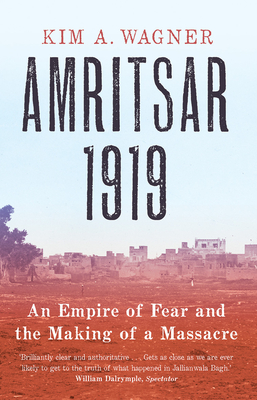

 Yale University Press
Yale University Press
Amritsar 1919: An Empire of Fear and the Making of a Massacre


Key Metrics
- Kim Wagner
- Yale University Press
- Paperback
- 9780300250718
- 7.8 X 5.1 X 1.1 inches
- 0.9 pounds
- History > Asia - India & South Asia
- English
 Secure Transaction
Secure TransactionBook Description
The Amritsar Massacre of 1919 was a seminal moment in the history of the British Empire, yet it remains poorly understood. In this dramatic account, Kim A. Wagner details the perspectives of ordinary people and argues that General Dyer's order to open fire at Jallianwalla Bagh was an act of fear. Situating the massacre within the deep context of British colonial mentality and the local dynamics of Indian nationalism, Wagner provides a genuinely nuanced approach to the bloody history of the British Empire.
Author Bio
I did my Ph.D. in South Asian history at the University of Cambridge (2000-03), supervised by the late Professor Sir C.A. Bayly. This was followed by a four-year Research Fellowship at King’s College, Cambridge, and a two-year Research Associate post at the University of Edinburgh.
I was subsequently employed as Lecturer in Imperial and World History at the University of Birmingham, before joining Queen Mary in 2012. Between 2015 and 2018, I had a Marie Sk?odowska-Curie Global Fellowship working with Dane Kennedy at George Washington University, DC.
My current book-project, on U.S. colonial violence in the Southern Philippines and the Bud Dajo Massacre of 1906, will be published by Public Affairs in 2023.
Research Interests
My research explores the forms and functions of violence and cultural (mis-)understanding within British and other imperial formations, and between the Western and the non-Western Worlds more generally. My work has largely focused on key conflicts and turning-points in the history of British India, and especially on indigenous resistance, involving ‘Thugs’, rebels, ‘fanatics’, or nationalists.
The attempt to reconstruct multiple perspectives, and move beyond conventional imperial history, has been central to this endeavor, for which I draw from the insights of anthropology and literary- and post-colonial studies. In my book, The Skull of Alum Bheg: The Life and death of a Rebel of 1857 (Hurst/OUP/Penguin India, 2017), I sought to recover the experience of an Indian rebel through a critical reading of the colonial archive ‘against the grain’. The micro-history of one man’s skull was furthermore situated within a broader, globally comparative, exploration of the wider colonial phenomenon of collecting war-trophies and exhibiting human remains.
My last book on the Amritsar Massacre of 1919 relies on the concept of ‘thick periodization’ to demonstrate how colonial anxieties, originating in the ‘Mutiny’ of 1857, shaped the British interpretation of unrest, and, crucially, dictated the levels of violence required to suppress it. This work speaks directly to current debates on the legacies of Empire, and especially the calls for reparations, repatriation and the decolonization of museums and universities in the West.
I am currently writing the first scholarly account of the Bud Dajo Massacre of 1906, which situates U.S. Empire and colonial violence in the southern Philippines within a global comparative context. Current research projects include: U.S. colonial violence and atrocities in the southern Philippines ‘Savage Warfare’ – colonial warfare and mass violence in the European and U.S. empires, 1885-1914 The colonial genealogy of modern counterinsurgency Colonial violence and the collecting of human trophies Legacies and afterlives of Empire in contemporary Britain The Amritsar Massacre of 1919 (Jallianwala Bagh) ‘Yellow Peril’ scares and the Boxer Rebellion 1900 in a global perspective The ‘Rashomon’-effect and historical narratives The concept of ‘going native’ as a (fictional) mode of colonial governance.
Source: Queen Mary University of London
Videos








Community reviews
Write a ReviewNo Community reviews